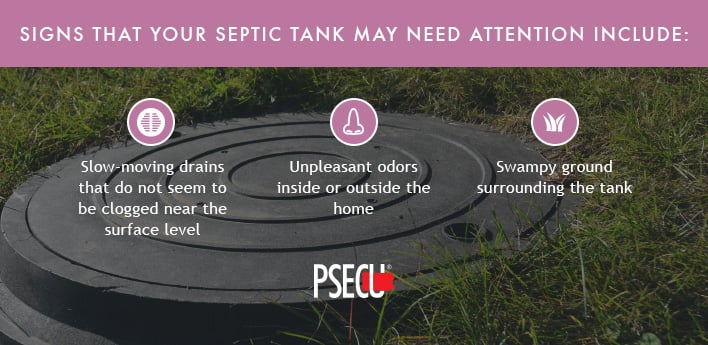One in five homes in the country relies on an onsite or community-based septic tank to treat wastewater. This generally applies to homes that do not use city or municipal water.
On a basic level, septic tanks are designed to treat wastewater leaving the home. The process prevents contaminated water from entering the drinking water or groundwater supply, helps to replenish aquifers and saves on high costs sometimes associated with city water systems.
Like any other system in or around a home, septic tank care is critical. When something goes wrong, the effects can be costly and devastating to a home and its surrounding yard. In this chapter, we’ll discuss how to care for and maintain your septic tank to prevent trouble in the future.
How to Maintain a Septic Tank
For most owners, having the septic tank inspected every three years and pumped every three to five years is adequate, though alternative systems containing electrical float switches, mechanical components or pumps should be inspected on a more frequent basis — annually is generally recommended.
Other factors that influence how frequently a septic tank should be pumped include:
- The size of the home, including the number of residents
- The size of the septic tank
- How much wastewater is generated
- The total volume of solids in the wastewater generated
During your regular maintenance, a septic service provider will check the tank for leaks, while examining the layers of sludge and sediment in your tank. This provides insight into how efficiently the system is operating and whether the tank needs to be pumped or not.
Because maintenance is not required frequently, in most cases, it’s important to ask your septic professional to write down the sludge levels and note any repairs that were completed, along with the overall condition of the tank. If the professional recommends additional repairs, it’s important to act quickly to prevent future problems.
In addition to regular maintenance, you can take daily steps to prolong the life of your septic tank.
One way to care for your septic system is to be more efficient with water in your home. Options include:
- Installing high-efficiency appliances and toilets that are designed to use less water and often come with energy rebates. To learn more, contact your electric supplier.
- Research and consider high-efficiency showerheads that use less water.
- Wash clothes responsibly. By selecting the correct load size, you can reduce water usage. Also, pre-treating stains before washing items can help prevent the need to repeat efforts.
Because your septic system is designed to remove waste, understanding what shouldn’t go down your drains and toilets is a great first step. Be sure to avoid:
- Grease
- Anything other than toilet paper (even if it says “flushable”)
- Dental floss
- Coffee grounds
- Cigarette butts
- Chemicals, lotions and thick soaps
- Feminine hygiene products
Additionally, limiting garbage disposal use can help protect your system. While it may be convenient, a garbage disposal allows waste to travel into your septic tank, increasing the number of compounds that would otherwise be undrainable and the sediment that should be avoided.
One last way to care for your septic system involves becoming familiar with your drain field and maintaining it properly. Your septic system’s drain field works to remove sediment from your system and is required to keep it running properly without becoming clogged. To maintain your drain field, consider:
- Not planting trees near it. Roots spread and grow over time and have been known to seriously damage septic tanks and pipes, in addition to other underground systems.
- Not driving or parking on it.
- Keeping other drainage systems — gutters, HVAC run-off and more — away from your drain field to prevent overuse.
Proper care and maintenance will ensure your system runs at an optimal level and will help avoid expensive repairs in the future.
Warning Signs That Your Septic Tank May Need Attention
While you may understand how to maintain your septic system, you should also know how to detect an issue with it and what to do when something goes wrong.
Signs that your septic tank may need attention include:
- Slow moving drains that do not seem to be clogged near the surface level
- Unpleasant odors inside or outside the home
- Swampy ground surrounding the tank
If you notice these signs, it’s in your best interest to call a professional right away. Because your septic system handles raw waste, acting quickly is paramount.
Read our other chapters
Chapter 1
Why Maintenance Matters and How to Budget for It
Chapter 2
Plumbing Maintenance — From Snaking a Main Drain to Dealing with Hard Water Clogs
Chapter 3
Well Maintenance — Water Well Maintenance Starts With Understanding Groundwater Basics
Chapter 4
Septic Tank Maintenance — Preventative Care for Your Tank and Spotting Warning Signs
Chapter 5
Sewer Line Maintenance — From Understanding How Systems Work to Spotting Clogs
Chapter 6
HVAC System Maintenance — Keeping Your Home Comfortable Throughout the Year
Chapter 7
Insulation — Better Insulating Your Home and Preventing and Addressing Drafts
Chapter 8
Home Exterior Maintenance — Saving Costs by Identifying Seasonal Tasks
Chapter 9
Home Improvement Ideas — Adding Value to Your Home and Getting a Return on Your Investment
Download all chapters as a PDF.

The content provided in this publication is for informational purposes only. Nothing stated is to be construed as financial or legal advice. Some products not offered by PSECU. PSECU does not endorse any third parties, including, but not limited to, referenced individuals, companies, organizations, products, blogs, or websites. PSECU does not warrant any advice provided by third parties. PSECU does not guarantee the accuracy or completeness of the information provided by third parties. PSECU recommends that you seek the advice of a qualified financial, tax, legal, or other professional if you have questions.



